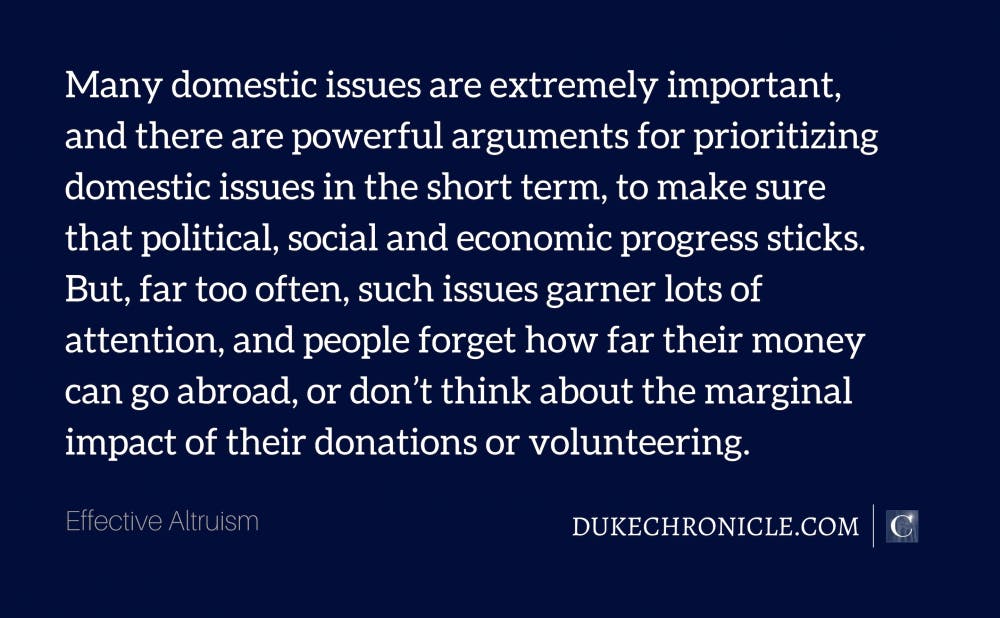In our last column, we wrote about four uncontroversial ideas which constitute key principles of the nascent Effective Altruism (EA) movement, of which Effective Altruism Duke is a small part. They were: that it’s important to help others; that people are equal; that helping more is better than helping less; and that we have limited resources.
But they’re not the full story.
EA is about these foundational ideas, but it’s also about their sometimes-surprising implications. People often don’t notice the consequences of their basic values, because we tend to have values at many levels of abstraction. For instance, I may care about the cohesion and flourishing of societies and cultures as a whole, but also care about the quality individual experience from moment to moment, and intermediates at many levels of abstraction between these. We won’t have to link far-apart levels of values here, but we’ll try to hint at how the four foundational ideas are less trivial than they may seem at first glance.
Almost all aspiring EAs agree about one thing: choosing your ethics is not easy, but it really matters. There are trade-offs everywhere. So let’s go through the ideas from last column, and see what their implications are from the EA perspective. Some of these claims will be slightly simplified, but you’ll get the idea.
First, EAs don’t just think it’s important to help others, but that most of us don’t help others enough. The average early career salary for a Duke alum may be $71,200. Most people are familiar with work by Daniel Kahneman and Angus Deaton suggesting that salary stops correlating with reported emotional wellbeing above $75,000. (The story is more complicated than this, because the paper also noted a more durable correlation between income and another component of subjective well being, namely reported life satisfaction. It’s a complicated picture. If you think this might be reason to reject our point, drop us a line.) By mid-career, the average Duke alum earns $142,800. Our argument is that people should give some of this away, more than they do on average. A common undertaking by members of the EA community is the Giving What We Can Pledge, a commitment of at least 10 percent of one’s lifetime earnings to effective charities. Don’t misunderstand us: this is not appropriate for everyone. Some of us have dependents, some of us have burdensome debt, some of us have health issues, some of us have other personal challenges to overcome. Disparate circumstances confer divergent obligations. But you get the idea.
Second, EAs don’t just think that people are equal, but that we privilege those spatially and socially near to us more often than we should. We often help people far away less because their suffering is less salient. It doesn’t walk up to us on the street, or present itself at family gatherings. It’s far away, in places we don’t have to visit. We don’t think that’s a good reason to neglect such people. If we decide we would rather make a donation at home, we should be explicit about our reasons for doing so, and remember that suffering there is the same as suffering here.
Third, EAs don’t just believe that helping more is better than helping less, but that maximizing is better than satisficing. In other words, we don’t think there is a threshold after which we don’t have to help anymore. If we have yet more financial means, time, energy, or other resources, there’s always a chance that we should be thinking about others. EA is not about self-sacrifice, but it is about sacrificing what doesn’t matter, while preserving and taking care of what does. However, many more things are luxuries than we realize. That’s why those of us who can do more, should take care to notice, and do more. We aspire to never “turn our ethics off.”
Finally, EAs don’t just believe that we have limited resources, but that we should understand the ethical trade-offs we face much better than we do. The fact is that money goes further in many places than it does in the United States. Some people don’t like the idea of putting a price on lives; we don’t like it either. We try to remember that the cost of saving a life is not the same as the value of a life, but that it matters when we’re trying to triage where to donate or lend a helping hand. EAs try to work out how to have the greatest marginal impact (in other words, what they should do, given what everyone else is doing). Many domestic issues are extremely important, and there are powerful arguments for prioritizing domestic issues in the short term, to make sure that political, social and economic progress sticks. But, far too often, such issues garner lots of attention, and people forget how far their money can go abroad, or don’t think about the marginal impact of their donations or volunteering. Some causes receive huge support; others not so much. The difference is not always warranted. Many don’t know how cheap bed-nets, women’s hygiene products, or micronutrient supplements are. Many don’t know the effects these can have on far-away communities. We want to know.
So, yes, EA is more complicated than we first intimated. The insights of Effective Altruism are not obvious, and not uncontroversial. If EA is a question, these ideas are the beginning of the discussion, not the end.
This column was written by Joe Choo-Choy, a Trinity sophomore, with input from members of Effective Altruism: Duke. If you have ideas, criticisms, or questions regarding Effective Altruism, reach out via effective.altruism.duke@gmail.com.
Get The Chronicle straight to your inbox
Signup for our weekly newsletter. Cancel at any time.

